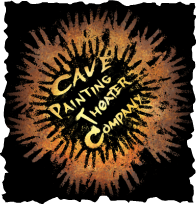The Player Queen (Fall 2012)
Welcome to Yeats' unnamed fictional kingdom, where a queen that no-one's ever seen rules from a great black house on a high rocky hill. Below her in the town and countryside, her subjects turn ignorance into a fine art-- they obsess over trivialities, pass and embellish absurd rumors, and construct terrifying and incomprehensible conspiracy theories. Above all, each of them knows that whoever is coming up the hill with dung-forks is coming for them. A mythical sex scandal attacks their way of life. The crowd in the streets, plotting revolution, is just trying to disturb their nightly routine.
Does this sounds familiar to you? Watch out! You might be living in a land where rulers are reviled by subjects too short-sighted to understand them, a land where public figures talk cavalierly of wife-beating, a land where leadership is determined by bloodline and primogeniture. Oh, just two out of three? Well, thank goodness your kingdom isn't like this one. Because in this kingdom, the only people who would bother to seize power are the ones with no scruples or dignity left to lose. Enjoy the play. And don't forget to vote! Gwen Kelly-Masterton, Director The Player Queen played at Gorilla Tango Theater and at Chief O'Neill's Pub. Cast and Crew: Primus: Aaron Silverman Secundus: Harold Jaffe Tertius: Jamel Booth Quartus: J.R. Pierce Quintus: Zach Brown Sexta: Allison Carvalho Septimus: Andrew Mehegan Octema: Erin Kelsey Nona: Jessica Goforth Decima: Amanda Faye Martin Producer/Director: Gwen Kelly-Masterton Co-Producer: Heidi Mullins-Lemieux Stage Manager: Margaret Morton Original Music: Throop McClurg Other Music: The Waterboys Masks: Genesee Spridco Costumes: Heidi Mullins-Lemieux Set: Gwen Kelly-Masterton, Patrick Downs, Elena Amesbury Photography: Malcolm Riordan |
Andromache (spring 2013)
Andromache is a product of French Neoclassicism, a movement in the 17th century to achieve new heights of artistic form and purity by revisiting the oldest and noblest stories from the most civilized ancient cultures. It was written to conform to the Three Unities of Aristotle-- no time jumps, no scene changes, and no subplots-- and the additional Neoclassical unities of Decorum (no-one may be rude) and Verisimilitude (only “realistic” speech and action allowed.) I have broken every one of those rules: you are about to see a story in which time and space are fluid, in which every character struggles with their own conflicts, and in which men and women whose pasts are dominated by a horrific war try to maintain a semblance of control over their lives while their emotions burst out of their hearts and their viscera hang out of their bodies. Andromache explores horror, glory, love, hate, loyalty, and betrayal in many permutations; it is a story of a new generation that struggles with its parents' legacy; and above all, it is the story of a mother's fight to keep her son alive. I would like to apologize to Jean Racine and his excellent 20th century translator Kenneth Muir for the violence I have done to this piece of literary history; I hope that what emerges, bloody but unbowed, is the story these talented poets might have told if storytelling was all they had to worry about.
Enjoy the show. Gwen Kelly-Masterton, Director Andromache played at Collaboraction Theatre. Cast and Crew: Orestes: Christopher Bott Hermione: Kate Donoghue Pyrrhus: Jem Herron Phoenix: Stephen McClure Cleone: Sarah Sapperstein Andromache: Helen Young Producer/Director: Gwen Kelly-Masterton Co-Producer: Elena Amesbury Stage Manager: Margaret Morton Music: Manu Delago Costumes: Elena Amesbury Set: Gwen Kelly-Masterton, Patrick Downs Mural: Elena Amesbury Photography: Malcolm Riordan |

